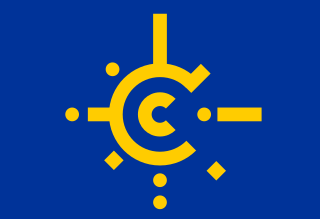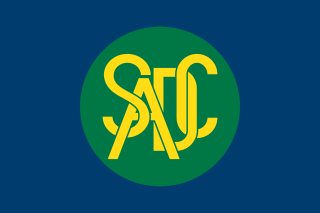
A customs union is generally defined as a type of trade bloc which is composed of a free trade area with a common external tariff.
A tariff is a tax imposed by a government of a country or of a supranational union on imports or exports of goods. Besides being a source of revenue for the government, import duties can also be a form of regulation of foreign trade and policy that taxes foreign products to encourage or safeguard domestic industry. Tariffs are among the most widely used instruments of protectionism, along with import and export quotas.

Protectionism is the economic policy of restricting imports from other countries through methods such as tariffs on imported goods, import quotas, and a variety of other government regulations. Proponents argue that protectionist policies shield the producers, businesses, and workers of the import-competing sector in the country from foreign competitors; however, they also reduce trade and adversely affect consumers in general, and harm the producers and workers in export sectors, both in the country implementing protectionist policies and in the countries protected against.

Economic sanctions are commercial and financial penalties applied by one or more countries against a targeted self-governing state, group, or individual. Economic sanctions are not necessarily imposed because of economic circumstances—they may also be imposed for a variety of political, military, and social issues. Economic sanctions can be used for achieving domestic and international purposes.

The Central European Free Trade Agreement (CEFTA) is an international trade agreement between countries mostly located in Southeastern Europe. Founded by representatives of Poland, Hungary and Czechoslovakia, CEFTA expanded to Albania, Bosnia and Herzegovina, Bulgaria, Croatia, Moldova, Montenegro, North Macedonia, Romania, Serbia, Slovenia and the UNMIK.

The Southern African Development Community (SADC) is an inter-governmental organization headquartered in Gaborone, Botswana. Its goal is to further regional socio-economic cooperation and integration as well as political and security cooperation among 16 countries in southern Africa.

An exclusive economic zone (EEZ), as prescribed by the 1982 United Nations Convention on the Law of the Sea, is an area of the sea in which a sovereign state has special rights regarding the exploration and use of marine resources, including energy production from water and wind. It stretches from the baseline out to 200 nautical miles (nmi) from the coast of the state in question. It is also referred to as a maritime continental margin and, in colloquial usage, may include the continental shelf. The term does not include either the territorial sea or the continental shelf beyond the 200 nautical mile limit. The difference between the territorial sea and the exclusive economic zone is that the first confers full sovereignty over the waters, whereas the second is merely a "sovereign right" which refers to the coastal state's rights below the surface of the sea. The surface waters, as can be seen in the map, are international waters.

The Council of Arab Economic Unity (CAEU) was founded by Egypt, Iraq, Jordan, Kuwait, Libya, Mauritania, Palestine, Saudi Arabia, Sudan, Tunisia, Syria, United Arab Emirates and Yemen on May 30, 1964, following an agreement in 1957 by the Economic Council of the Arab League.

The Central American Integration System has been the economic and political organization of Central American states since 1 February 1993. On 13 December 1991, the ODECA countries signed the Protocol of Tegucigalpa, extending earlier cooperation for regional peace, political freedom, democracy and economic development. SICA's General Secretariat is in El Salvador.

Qualifying Industrial Zones (QIZ) are industrial parks that house manufacturing operations in Jordan and Egypt. The QIZ program was introduced in 1996 by the U.S. Congress to stimulate regional economic cooperation. Goods produced in QIZ-designated areas in Egypt, Jordan and the Palestinian territories can directly access U.S. markets without tariff or quota restrictions, subject to certain conditions. To qualify, goods produced in these zones must contain a small portion of Israeli input. In addition, a minimum 35% value to the goods must be added to the finished product. The idea was first proposed by Jordanian businessman Omar Salah in 1994.
Drinking water supply and sanitation in Egypt is characterized by both achievements and challenges. Among the achievements are an increase of piped water supply between 1998 and 2006 from 89% to 100% in urban areas and from 39% to 93% in rural areas despite rapid population growth; the elimination of open defecation in rural areas during the same period; and in general a relatively high level of investment in infrastructure. Access to an at least basic water source in Egypt is now practically universal with a rate of 98%. On the institutional side, the regulation and service provision have been separated to some extent through the creation of a national Holding Company for Water and Wastewater in 2004, and of an economic regulator, the Egyptian Water Regulatory Agency (EWRA), in 2006.

The Eurasian Economic Union (EAEU) is an economic union of post-soviet states located in Eastern Europe, Western Asia and Central Asia. The Treaty on the Eurasian Economic Union was signed on 29 May 2014 by the leaders of Belarus, Kazakhstan, and Russia, and came into force on 1 January 2015. Treaties aiming for Armenia's and Kyrgyzstan's accession to the Eurasian Economic Union were signed on 9 October and 23 December 2014, respectively. Armenia's accession treaty came into force on 2 January 2015. Kyrgyzstan's accession treaty came into effect on 6 August 2015. Kyrgyzstan participated in the EAEU from the day of its establishment as an acceding state.

Since the end of apartheid foreign trade in South Africa has increased, following the lifting of several sanctions and boycotts which were imposed as a means of ending apartheid.

The future enlargement of the Eurasian Economic Union is theoretically open to any of the Post-Soviet states and potentially any country of Europe or Asia. In order to accede, a state must fulfill certain economic and political requirements. Enlargement of the Union is also subject to the consent of all existing members and the candidate's adoption of existing EEU laws and implementing previous decisions made by the Eurasian Economic Commission. The present agenda of the enlargement of the Eurasian Economic Union is primarily focused on Tajikistan. Meanwhile, Moldova was granted Observer Status in April 2017, followed by Uzbekistan and Cuba in December 2020. The process of enlargement is referred to as Eurasian integration or Eurasianism. This term is also used to refer to the intensification of economic cooperation between Eurasian Economic Union member states.
The 2018 Cyprus gas dispute is a diplomatic dispute involving the exclusive economic zone (EEZ) of the Republic of Cyprus in the eastern Mediterranean, which began on February 6, 2018. The dispute followed remarks made by Turkey's foreign minister Mevlüt Çavuşoğlu, rejecting a 2003 Cypriot-Egyptian maritime border demarcation deal and announcing the Turkish government's intention to carry out gas exploration in the region. Tensions in the region further escalated on February 9, when the Turkish Navy blocked a drill ship operated by Italian oil company Eni S.p.A., licensed by the government of the Republic of Cyprus, from exploring gas reserves off the island.

The Trump tariffs are a series of United States tariffs imposed during the presidency of Donald Trump as part of his "America First" economic policy to reduce the United States trade deficit by shifting American trade policy from multilateral free trade agreements to bilateral trade deals. In January 2018, Trump imposed tariffs on solar panels and washing machines of 30 to 50 percent. In March 2018, he imposed tariffs on steel (25%) and aluminum (10%) from most countries, which, according to Morgan Stanley, covered an estimated 4.1 percent of U.S. imports. In June 2018, this was extended to the European Union, Canada, and Mexico. The Trump administration separately set and escalated tariffs on goods imported from China, leading to a trade war.

The China–United States trade war is an ongoing economic conflict between China and the United States. In January 2018, U.S. President Donald Trump began setting tariffs and other trade barriers on China with the goal of forcing it to make changes to what the U.S. says are "unfair trade practices" and intellectual property theft. The Trump administration stated that these practices may contribute to the U.S.–China trade deficit, and that the Chinese government requires transfer of American technology to China. In response to US trade measures, the Chinese government accused the Trump administration of engaging in nationalist protectionism and took retaliatory action. After the trade war escalated through 2019, on January 15, 2020, the two sides reached a phase one agreement, however tensions continued to persist. By the end of the Trump presidency, the trade war was widely characterized as a failure.

The Armenian Customs Service is a subsidiary department of the State Revenue Committee responsible for customs services on behalf of the Armenian government, headquartered in Yerevan.












